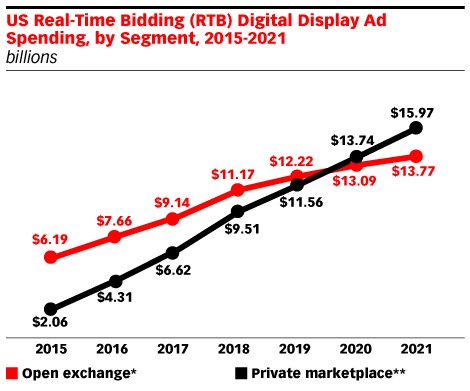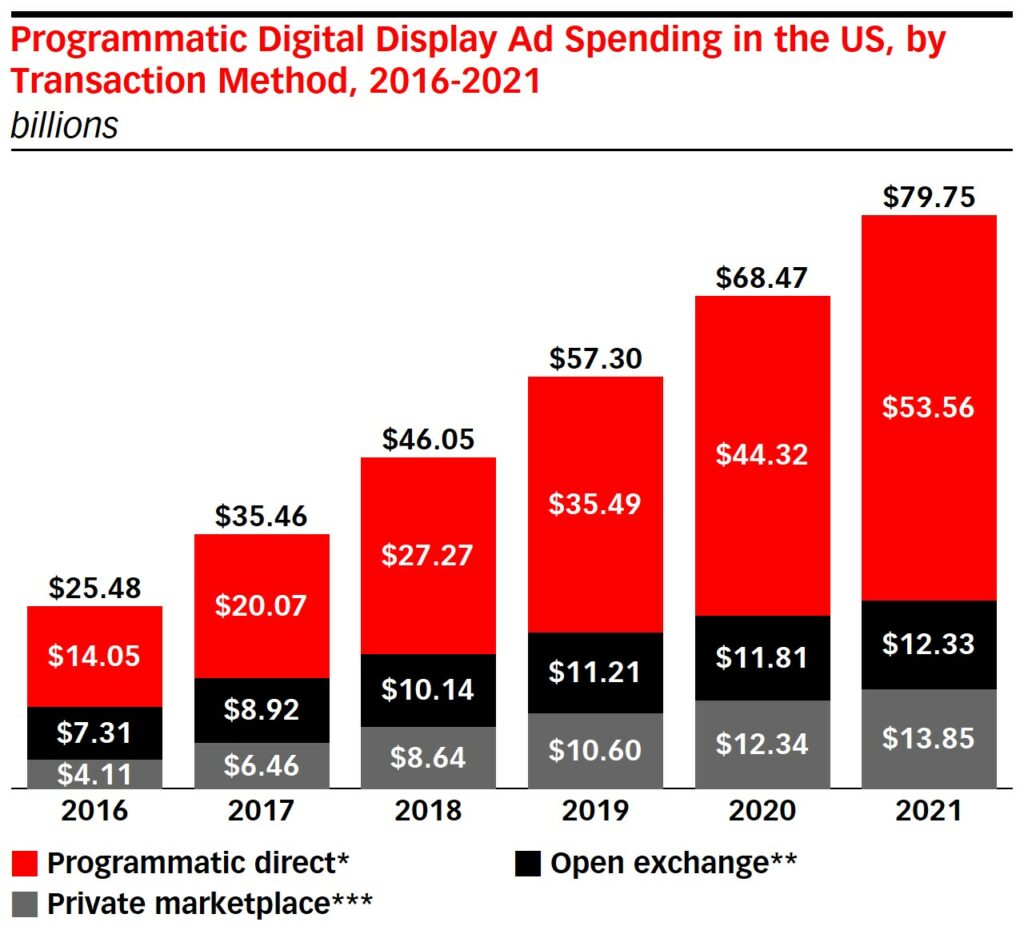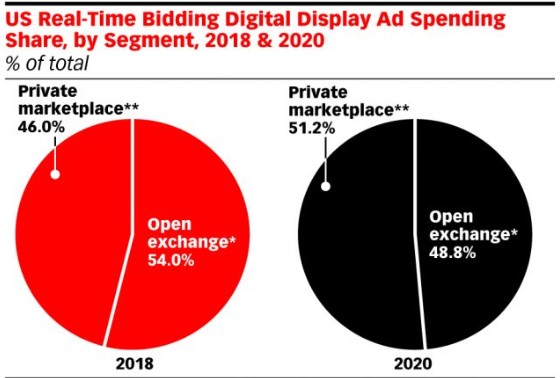
What is Private Marketplace PMP

I. Introduction
Private Marketplace (PMP) in programmatic advertising is a private auction in which buyers and sellers can securely transact in the buying and selling of digital ad space. In the PMP, buyers and sellers agree to certain conditions (such as pricing, target audience, etc.). PMPs allow buyers to reach more specific audiences, as well as ensure more transparency in the buying process. PMPs also provide buyers with better control over the inventory they are buying, as well as easier access to premium inventory.
In other words, Private Marketplace (see real time bidding for comparison) deals are a type of advertising sales arrangement that allows publishers to sell their inventory to a pre-selected group of buyers. This article will provide an overview of PMP deals, including how they work, the advantages they can provide to publishers, and the challenges that publishers may face when using PMP deals. By understanding the basics of PMP deals, publishers can decide whether they may be a good fit for their business and help to optimize their advertising sales strategy.

Private marketplace (PMP) deals are a way for advertisers to buy ad impressions from specific publishers at a fixed price. The purpose of PMP deals is to give advertisers more control over where their ads are shown, and to provide publishers with a way to sell their ad inventory to specific advertisers at a premium price. This can help both advertisers and publishers to achieve their goals more effectively, by allowing them to target their ads to specific audiences and to maximize the value of their ad inventory. PMP deals can also help to improve the overall quality of the ads that are shown on a publisher’s website, since advertisers are able to carefully select the publishers that they want to work with.
II. How do Private Marketplace PMP deals work?
The process for setting up and conducting a PMP deal typically involves the following steps:
- The publisher identifies a group of buyers who are interested in purchasing their inventory. This group of buyers may include advertisers, agencies, or other parties that are interested in buying the publisher’s inventory.
- The publisher and buyers negotiate the terms of the PMP deal, including the specific inventory that will be made available, the pricing and terms of the sale, and any other special conditions that apply.
- The publisher sets up the PMP deal on a technology platform, such as an ad exchange or demand-side platform (DSP). This platform will facilitate the buying and selling process and provide reporting and analytics capabilities.
- The publisher makes the inventory available for purchase through the PMP deal. Buyers can then purchase the inventory according to the terms of the deal, such as by bidding on the inventory or purchasing a specific number of impressions.
- The publisher and buyers can track the performance of the PMP deal using the technology platform, which can provide real-time reporting and analytics. This can help publishers to understand the performance of their inventory and make more informed decisions about how to optimize their sales strategy.
Overall, PMP deals involve the negotiation of terms, the use of technology to facilitate the buying and selling process, and ongoing tracking and analysis of the performance of the deal.
III. Components of Private Marketplace PMP
Private marketplace (PMP) deals typically involve several different components, including the following:
- A group of pre-selected buyers: PMP deals are typically only available to a pre-selected group of buyers, which can include advertisers, agencies, or other parties that are interested in purchasing advertising inventory.
- A set of specific inventory: PMP deals typically involve a specific set of inventory that is made available for purchase, such as a specific set of ad slots on a particular website or app.
- Negotiated pricing and terms: PMP deals often involve negotiated pricing and terms, such as the minimum price that the publisher is willing to accept for the inventory, the number of impressions that can be purchased, and any other special terms or conditions that apply to the sale.
- An auction or bidding process: In some cases, PMP deals may involve an auction or bidding process in which buyers can bid on the available inventory, with the highest bidder winning the right to purchase the inventory.
- A technology platform: PMP deals typically involve the use of a technology platform that facilitates the buying and selling process, such as an ad exchange or demand-side platform (DSP). This platform can help to automate the process of buying and selling inventory, as well as providing reporting and analytics capabilities. Private marketplaces use deal IDs to conduct auctions, connecting the demand-side platform (DSP) to the publisher’s existing supply-side platform. This process is similar to the open exchange, where advertisers bid using a cost-per-mille (CPM) model to select specific audiences or content that is valuable to them.
V. Advantages of Private Marketplace PMP
In the realm of programmatic advertising, Private Marketplaces (PMPs) can provide increased reach and quality assurance, as well as data-driven insights that can help optimize campaigns. PMPs provide a secure and controlled environment for buyers and sellers to transact inventory with an added layer of transparency, ensuring the quality and relevance of each impression.
1. The advantages for advertisers
The advantages of Private Marketplace for advertisers include:
A. Increased Reach
The private marketplace PMP has seen an increased reach in the context of programmatic advertising. This is due to the growth of programmatic advertising, which is a digital advertising method that automates the buying and selling of ads. As a result, private marketplace PMPs have become more popular as they offer a more efficient way to manage and track ad campaigns.
B. Quality Assurance
Quality assurance (QA) of private marketplace PMP programs in the context of programmatic advertising is essential to protect the interests of the programmatic advertising ecosystem and the end users.
QA is a process that ensures the quality of products and services delivered to the customer. In the context of programmatic advertising, QA is responsible for verifying that the advertising delivered through programmatic platforms is of high quality.
The programmatic advertising ecosystem is complex, and it is essential that the advertising delivered through the platform is of high quality. This is especially important for users of the platform, who may be investing their time and money in the advertising.
QA is necessary to ensure that the advertising delivered through the platform is of high quality. This is especially important for users of the platform, who may be investing their time and money in the advertising.
There are a number of ways in which QA can ensure the quality of the advertising delivered through the platform. These include:
-Verifying that the ads are delivered in the correct format and at the correct time
-Ensuring that the ads are of the correct quality
-Verifying that the ads are targeting the correct users
-Tracking the performance of the ads
-Monitoring the impact of the ads
QA is an important part of the programmatic advertising ecosystem, and it is essential that it is carried out in a thorough and rigorous manner.
C. Data-Driven Insights
Data-driven insights of private marketplace PMP of programmatic advertising is a hot topic in the industry. With the advent of big data and the ability to track and analyze the performance of ads across different channels, it is no surprise that many advertisers are looking for tools that can help them make better decisions about where and how to spend their advertising dollars.
There are a number of different platforms that offer data-driven insights, but which one is right for you? Some of the most popular programs include Adobe Campaign, Microsoft Advertising Platform, and Oracle’s PluralSight.
Adobe Campaign is a popular program because it offers a wide range of data-driven features, including ad performance tracking, audience segmentation, and campaign optimization. Microsoft Advertising Platform is popular because it offers a wide range of tools for tracking and analyzing ad performance, as well as the ability to create and manage ad campaigns across multiple channels. Oracle’s PluralSight is popular because it offers a wide range of data-driven features, including ad performance tracking, audience segmentation, and campaign optimization.
Each program has its own set of features and benefits, so it is important to research each one carefully before making a decision. Once you have chosen a program, be sure to start using the data-driven insights to make better decisions about where and how to spend your advertising dollars. Some of the key data-driven insights that PMP deals can provide include:
- Real-time reporting and analytics: PMP deals often involve the use of technology platforms that provide real-time reporting and analytics capabilities. This can help publishers to understand the performance of their inventory in real-time, allowing them to make more informed decisions about how to optimize their sales strategy.
- Detailed information about buyers: PMP deals can also provide detailed information about the buyers who are purchasing the publisher’s inventory. This can include information such as the buyer’s location, the type of ad they are purchasing, and the price they are paying for the inventory.
- Trends and patterns in buying behavior: By analyzing the data generated by PMP deals, publishers can gain insights into trends and patterns in buying behavior. For example, they may be able to identify which types of ads are most popular with buyers, or which buyers are willing to pay the most for their inventory.
D. No Ad Fraud
No problem of spoofing or other types of ad fraud. While PMP deals do not inherently prevent ad fraud, they can help to reduce the risk of fraud by giving advertisers more control over where their ads are shown. This is because PMP deals involve direct negotiations between advertisers and publishers, advertisers can choose to work only with reputable publishers that have a track record of providing high-quality ad inventory. This can help to reduce the risk of ads being shown on low-quality websites that are more likely to engage in fraudulent activity. Additionally, because the terms of a PMP deal are agreed upon in advance, both parties have a clear understanding of what is expected of them, which can help to reduce the potential for misunderstandings or fraudulent activity.
E. Increased Control
With the advent of programmatic advertising, marketers have seen an increase in their ability to control the private marketplace. This has led to a decrease in the number of third-party sellers and an increase in the number of buyers. This has also led to an increase in the amount of data that is collected on each individual.
F. Improved Efficiency
Programmatic advertising is one of the most efficient and effective ways to reach audiences without doubt. However, there is also no doubt that it can be challenging to manage and execute it. This is where the private marketplace PMP can come in handy.
PMP can improve the revenue of programmatic advertising. This is due to premium ad placement, viewability rates, and CPMs in PMP deals being mostly high.
In addition, the private marketplace PMP can also help businesses save money on their advertising campaigns. This is because it can help them avoid spending money on ads that are not reaching their target audience.
Overall, the private marketplace PMP can help businesses improve their efficiency and save money on their advertising campaigns, and it helps publishers to increase their revenue.
2. The advantages for publishers
There are several advantages that website publishers can gain by using private marketplace (PMP) deals. These advantages include:
A. Increased control over the sale of inventory
With PMP deals, publishers can have more control over the sale of their inventory. They can choose which buyers are eligible to participate in the PMP and set specific parameters for the sale of their inventory, such as the minimum price they are willing to accept or the number of impressions that can be purchased.
B. Better prices for inventory
Because PMP deals involve a pre-selected group of buyers who are interested in purchasing the publisher’s inventory, publishers are more likely to receive higher prices for their inventory than they would through other sales channels.
Private Marketplace PMP providers have seen an increase in revenues in the context of programmatic advertising. This is likely due to the increasing demand for programmatic advertising, as well as the growth of the private marketplace PMP industry. Programmatic ad spending increase by years:

C. Streamlined sales process
PMP deals can help to streamline the sales process for publishers, as they can automate the process of selling inventory to a pre-selected group of buyers. This can save time and resources that would otherwise be spent on managing a direct sales team.
D. Improved transparency and reporting
PMP deals often involve the use of technology platforms that provide reporting and analytics capabilities. This can help publishers to better understand the performance of their inventory and make more informed decisions about how to optimize their sales strategy.
E. Enhanced relationships with buyers
PMP deals can also help publishers to build stronger relationships with their buyers. By working with a pre-selected group of buyers through a private marketplace, publishers can establish a more collaborative and transparent relationship, which can lead to better outcomes for both parties.
F. No need for a direct sales team
Everything is automated. Publishers can use AI instead of a sales team that can be expensive. Private marketplace (PMP) deals can help publishers by streamlining the process of selling advertising inventory to specific buyers. Rather than relying on a direct sales team, publishers can use PMP deals to automate the process of selling advertising inventory to a pre-selected group of buyers. This can help publishers save time and resources that would otherwise be spent on managing a direct sales team.
Additionally, PMP deals can help publishers to maximize the value of their inventory by allowing them to set specific parameters for the sale of their inventory, such as setting a minimum price or limiting the number of impressions that can be purchased.
Overall, PMP deals can be an effective way for publishers to optimize the way they sell advertising inventory without the need for a direct sales team.
These are the reasons that lead to higher popularity of PMP deals:

VI. Challenges of Private Marketplace PMP
Private Marketplace PMP is a complex technical platform that offers an efficient way to manage and optimize programmatic advertising. However, this platform can be resource intensive to use in the context of programmatic advertising. This can be due to the need to manage large data sets, as well as the need to optimize ad campaigns quickly. CineWeb offers plug and go solutions: Big brands are waiting to run high budget campaigns on your website.
Some challenges for advertisers:
1. Challenges for advertisers
A. Technical Complexity
Private marketplace PMP is a complex technical platform that can be used for programmatic advertising. It offers many features, such as the ability to create and manage ad campaigns, track performance, and analyze data. However, this platform can be difficult to use, and it can be difficult to understand how it works. This can make it difficult to create effective ad campaigns.
B. Resource Intensiveness
Private marketplace PMP can be a disadvantage in the context of programmatic advertising. This is because the private marketplace PMP is more resource intensive than other types of PMPs. This means that it may be more difficult to find a qualified PMP to work with in the context of programmatic advertising. Additionally, the private marketplace PMP may not be as widely accepted as other types of PMPs. This may make it difficult to find a qualified PMP to work with in the context of programmatic advertising
Private Marketplace PMP is a programmatic advertising platform that allows advertisers to buy and sell ads directly to publishers. It is a more efficient way to buy and sell ads because it eliminates the need for middlemen. This platform is useful for small businesses and agencies that want to sell their ad space directly to publishers.
C. Lack of scale
The private marketplace PMP is an invaluable asset for programmatic advertising professionals, providing the necessary scale to become a major player in the industry.
The private marketplace PMP is an invaluable asset for programmatic advertising professionals, providing the necessary scale to become a major player in the industry. However, due to the lack of scale of the private marketplace PMP, programmatic advertising professionals may find it difficult to compete with larger, more established advertising platforms.
D. Limited access to inventory
There are a few disadvantages to limited access to inventory in private marketplaces in programmatic advertising. First, advertisers may not be able to find the right ad space or target the right audience. Second, because there is a limited number of ads available, prices may be higher than if more ads were available. Finally, if an advertiser is not able to find the right ad space, they may not be able to generate the desired response from potential customers.
2. Challenges for publishers
There are several challenges that publishers may face when using private marketplace (PMP) deals. Some of the key challenges include:
A. Limited access to buyers
Because PMP deals involve a pre-selected group of buyers, publishers may not have access to the same pool of buyers that they would through other sales channels. This can limit the potential reach and revenue potential of PMP deals.
B. Competition from other publishers
In a PMP, publishers are competing with a pre-selected group of other publishers for the attention of buyers. This can make it more difficult for publishers to stand out and generate significant revenue from PMP deals.
C. Difficulty setting the right price
PMP deals often involve the negotiation of pricing and terms, which can be challenging for publishers. They must strike a balance between setting a high enough price to maximize revenue, while also being competitive enough to attract buyers.
D. The need for technology and expertise
PMP deals typically involve the use of technology platforms to facilitate the buying and selling process. This can be challenging for publishers who are not familiar with the technology or who do not have the resources to invest in it.
Overall, while PMP deals can provide several benefits to publishers, they can also be challenging to implement and manage effectively. Publishers must carefully consider the potential challenges and weigh them against the potential benefits before deciding whether to use PMP deals.
VII. Conclusion
In conclusion, private marketplace (PMP) deals are a type of advertising sales arrangement that allows publishers to sell their inventory to a pre-selected group of buyers. PMP deals can provide several advantages to publishers, including increased control over the sale of their inventory, better prices for their inventory, and a streamlined sales process. PMPs can also provide data-driven insights that can help publishers to optimize their sales strategy and maximize the value of their inventory. Overall, PMP deals can be an effective way for publishers to optimize the way they sell advertising inventory without the need for a direct sales team.
CineWeb has a big variety of demand from direct deals with brands and is ready to boost your revenue beyond PMP deals. Contact us for skyrocketing your revenue with premium ads.





